CEE Annual Darwin's Birthday Debate is hosted at the Natural History Museum every February. The debate consists of two or three speakers followed by a panel discussion on a currently relevant topic.
- Tuesday 27th February 2024 - Celebrating 30 Years of CEE: The Past and Future of Genetic and Phenotypic Evolution
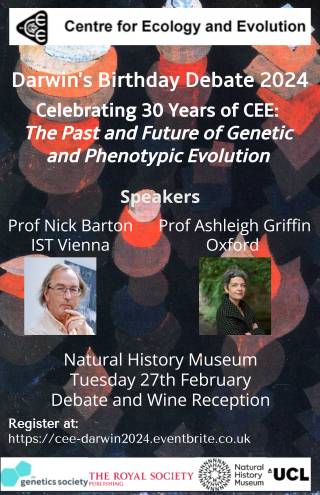
Please register via Eventbrite https://cee-darwin2024.eventbrite.co.uk
To mark this occasion, we are pleased to be able to offer several awards to enable early-career researchers and those with caring responsibilities the opportunity to attend this debate. This is possible due to the support from the Genetics Society.The following awards are available:
· Travel awards for early-career researchers based outside of London who would like to attend. These awards will cover the costs of travel from elsewhere in the UK, as well as accommodation in London for one night. The deadline for applications is Monday 19th February.
· Carers awards to support the attendance of researchers with caring responsibilities, which could be put towards childcare or other caring costs. The deadline for applications is Friday 23rd February.
· We can sponsor 10 early-career researchers to join the speakers and CEE committee for dinner after the debate. The deadline for applications is Friday 23rd February.
To apply for any of these awards, please register for free at https://forms.gle/gwtxDRUGoZJEEuhT7
If you have any questions or queries, please contact cee@ucl.ac.uk
- Tuesday 28th February 2023 - Science, Policy and Activism
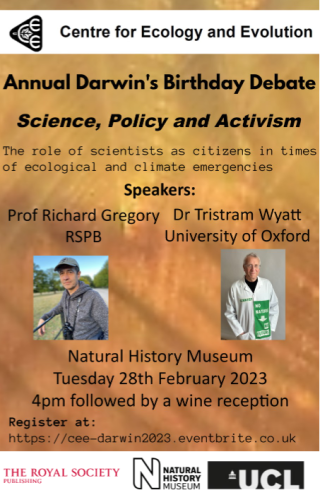
Speakers
Prof Richard Gregory, RSPB -
Dr Tristram Wyatt, University of Oxford -
YouTube Widget Placeholderhttps://www.youtube.com/watch?v=n1sADJb6qmo
In the media: Should scientists engage in policy or activism? by Sabhrina Aninta
Sponsorship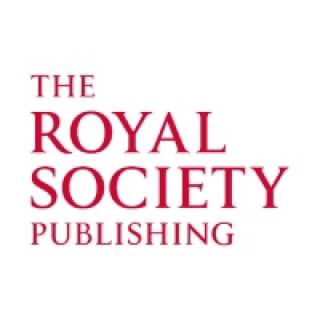
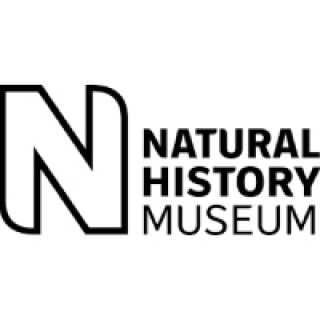

- Wednesday 2nd February 2022 - 'Viruses and the COVID-19 Pandemic'
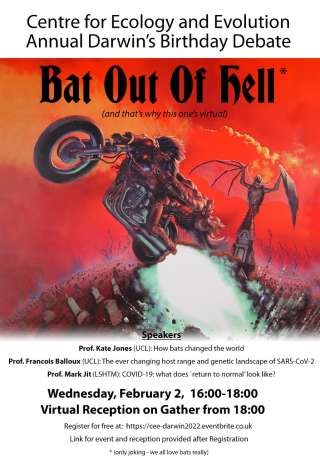
Speakers
Professor Kate Jones, University College London - 'How Bats Changed the World'
Professor Francois Balloux, University College London - 'The Ever Changing Host Range' and Genetic Landscape of SARS-COV-2'
Professor Mark Jit, London School of Hygiene and Tropical Medicine - 'COVID-19: What Does Return to Normal Look Like?'
- Wednesday 18th March 2021 - Mathematical Modelling in Evolution
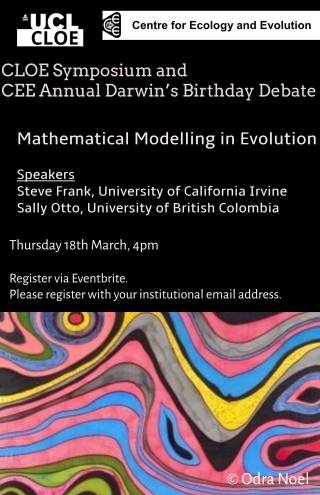
Speakers
Steve Frank, University of California, Irvine - 'Microbial metabolism: demography shapes biochemistry'
Abstract:Sally Otto, University of British Columbia - 'Linking levels of selection with genetic modifiers'
Abstract:
- Wednesday 12th February 2020 - 'The Biodiversity Crisis: Innovations and Solutions'
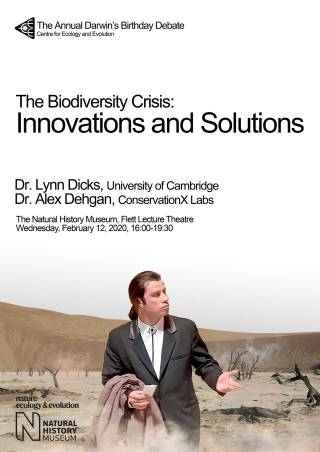
Speakers
Dr Lynn Dicks - University of Cambridge -
Abstract:
Dr Alex Dehgan - Conservation X Labs -
Abstract:
- Wednesday 13th February 2019 - 'The Next Stage of Human Evolution'
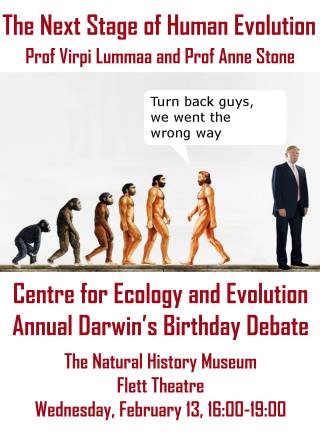
SpeakersAnne Stone, Arizona State University - 'The future of human evolution: we are what we eat if we survive the pathogens we keep?'
Abstract: We can gain insight into the future of human evolution by looking at our past. Research in my laboratory focuses on evolutionary history and understanding how humans and other primates have adapted to their environments, including their disease and dietary environments. I will discuss how we use genetic data to understand how diet and disease have shaped our genomes and affected our population history.Virpi Lummaa, University of Turku - 'Natural selection – now!'
Abstract: The Industrial Revolution and the accompanying nutritional, epidemiological and demographic changes have profoundly changed human ecology and biology, leading to major shifts for example in our disease patterns, lifespan, family size or age at puberty. These recent social and cultural adaptations have cast doubt on the continued relevance of Darwinian selection in humans – we now have modern medical care and effective contraceptive methods so does that mean evolution by natural selection has stopped? I will discuss how mismatches between past adaptations and the current environment mean that gene variants linked to higher fitness in the past may now predispose us to non-communicable diseases, such as Alzheimer disease, cancer and coronary artery disease. Moreover, in both traditional and industrialized societies, differences among individuals still lead to selection favouring certain heritable traits because although survival to old age can be high, not everyone has the same family size and many forego reproduction altogether. In line with this, increasing evidence suggests that the transition to modernity has also altered the direction and intensity of natural selection acting on many traits, with important implications for public and global health.
- Wednesday 7th February 2018 - '60 Years of Central Dogma
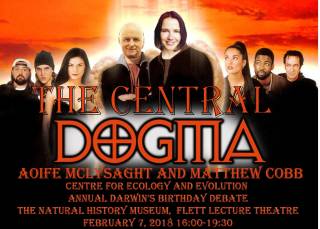
SpeakersProfessor Aoife McLysaght, Trinty College Dublin - 'Turning noise into information'
Abstract:Professor Matthew Cobb, University of Manchester - 'What did Crick’s ‘central dogma’ really mean?'
Abstract: 60 years ago, Francis Crick’s article ‘On protein synthesis’ was published, based on lecture he gave the previous year. I will explore what he was trying to do in the lecture, and in particular what exactly he meant by the ‘central dogma’, the extent to which this was a change over previous ways of understanding what is in a gene, and how his ideas have been misinterpreted and misunderstood, in particular in textbooks.
- Wednesday 17th February 2017 - 'On the Origins of the Domestic Dog'
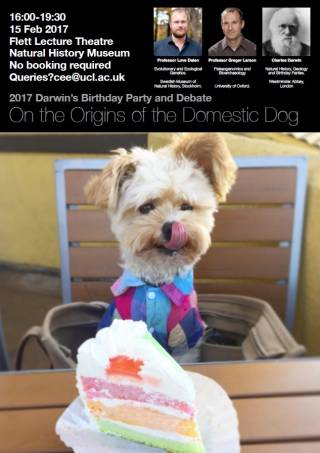
Speakers
Professor Love Dalen, Swedish Museum of Natural History - 'Recalibrating canid evolution using ancient DNA'
Abstract: Most researchers agree that the wolf is the ancestor of the dog, and that dogs were domesticated sometime during the last Ice Age. However, there is considerable disagreement on where and how domestication happened, as well as exactly when the divergence between dogs and wolves took place. The aim of this talk is to outline how recent genomic data from Pleistocene canid remains now allows us to start disentangling the history of dogs and wolves in much better detail.Professor Greger Larson, University of Oxford - 'On the Impossibility of Dogs'
Abstract: The earth is home to 150 million dogs. And dogs were unequivocally the first domestic plant or animal. Despite their ongoing pivotal role in human history, we don’t really understand where and when and how many times they were domesticated. In this talk I will focus on why we still know nothing and describe efforts underway that will lead to a satisfying answer.
- Wednesday 10th February 2016 - 'How Does Animal Behaviour Influence Evolution'
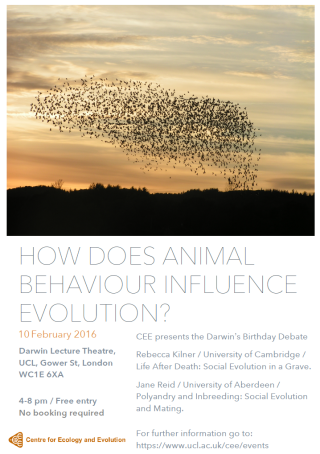
Speakers
Professor Rebecca Kilner, University of Cambridge (Department of Zoology) - 'Life After Death: Social Evolution in a Grave'
Abstract: Although it is well-understood how evolution influences animal behaviour, it is much clear how adaptive behaviour then influences the subsequent course of evolution. Our lab focuses on one sort of behaviour, parental care, and uses experiments on the burying beetle to analyse how parental care influences distinct components of the evolutionary process. I will describe experiments that show how burying beetle parents influence the ecological conditions experienced by developing offspring, how parents can be agents of natural selection, and how different regimes of post-hatching care can accelerate or retard the pace of evolutionary change.Professor Jane Reid, University of Aberdeen (School of Biological Sciences) - 'Polyandry and Inbreeding: Social Evolution and Mating'
Abstract:Reproductive strategies enacted by individual organisms define social interactions and influence allele and genotype frequencies in subsequent generations, and thereby shape the course of evolution. However, we still do not fully understand the evolution or persistence of the widespread reproductive strategies that involve multiple mating, inbreeding and parental care. I applied quantitative genetic analyses to comprehensive pedigree, reproductive strategy and fitness data from socially monogamous but genetically promiscuous song sparrows (Melospiza melodia), to estimate genetic (co)variances that could drive or constrain ongoing micro-evolution of reproductive strategies.These analyses show how interactions between females and males can shape reproductive strategies, and illustrate how key evolutionary hypotheses can be explicitly tested in nature.
- Wednesday 11th February 2015 - 'How Did Life Begin?'
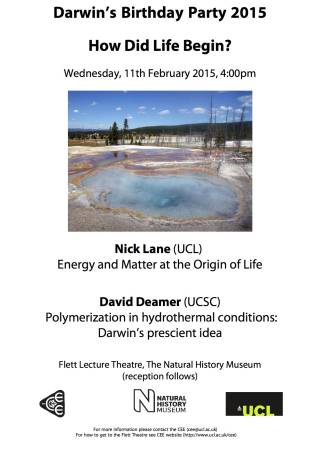
Speakers
Nick Lane, University College London (Genetics, Evolution and Environment) - 'Energy and Matter at the Origin of Life'
Abstract: There is a paradox at the base of life. Membrane bioenergetics - the use of ion gradients across membranes to drive carbon and energy metabolism - are universal, but membranes are not. Radical differences between bacteria and archaea in membrane chemistry and active ion pumping suggest that LUCA, the last universal common ancestor, may have used natural proton gradients in alkaline hydrothermal vents to drive growth. I will outline a possible scenario for the origin of life in this environment, and present some experimental and modelling results which suggest that proton gradients could have driven the transition from geochemistry to biochemistry, and the deep divergence of archaea and bacteria.
Dave Deamer, University of California, Santa Cruz CA (Department of Bimolecular Engineering) - 'Polymerization in hydrothermal conditions: Darwin's prescient idea'
Abstract: In an often quoted note to Joseph Hooker in 1871, Darwin speculated that life may have begun in a "warm little pond." We have tested this idea in simulations of fluctuating hydrothermal fields associated with volcanism. We found that the chemical energy available in such conditions can drive polymerization of ordinary mononucleotides into surprisingly long oligonucleotides resembling ribonucleic acid (RNA). The polymerization occurs in lipid environments so that the RNA-like polymers become encapsulated in membranous compartments to form protocells, the first milestone on the evolutionary path toward primitive cellular life
- Wednesday 12th February 2014 - 'rb>c@50: The Golden Anniversary of Hamilton’s Rule'
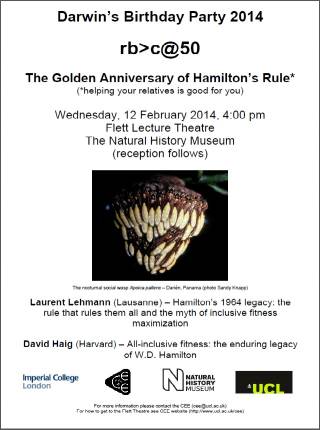
Speakers
Laurent Lehmann, Université de Lausanne, Switzerland - 'Hamilton's 1964 legacy: the rule that rules them all and the myth of inclusive fitness maximization'
Abstract: This talk will present the key steps to derive the rb-c>0 rule and discuss the two results obtained by Hamilton in his 1964 paper: (1) an equation describing allele frequency change under natural selection expressed in terms of phenotypic cost and benefit and a genealogical concept of relatedness; and (2) a result about the maximization of inclusive fitness. The first result has been extended to all conditions and provides the rule that rules them all. The second result applies only under narrow conditions and points to a mismatch between Hamilton's aim for inclusive fitness and what has been proved over the last 50 years.David Haig, Harvard University - 'All-inclusive fitness: the enduring legacy of W. D. Hamilton'
Abstract: W. D. Hamilton's concept of inclusive fitness revolutionized the way we think about social interactions. Individuals were shown to have an interest in each other's well-being to the extent that they shared common genes. His insights have had unexpected medical applications to understanding conflicts within genomes between genes inherited from fathers and genes inherited from mothers and to understanding how sibling rivalry can be expressed in the mother's womb during the early stages of pregnancy.
 Close
Close

